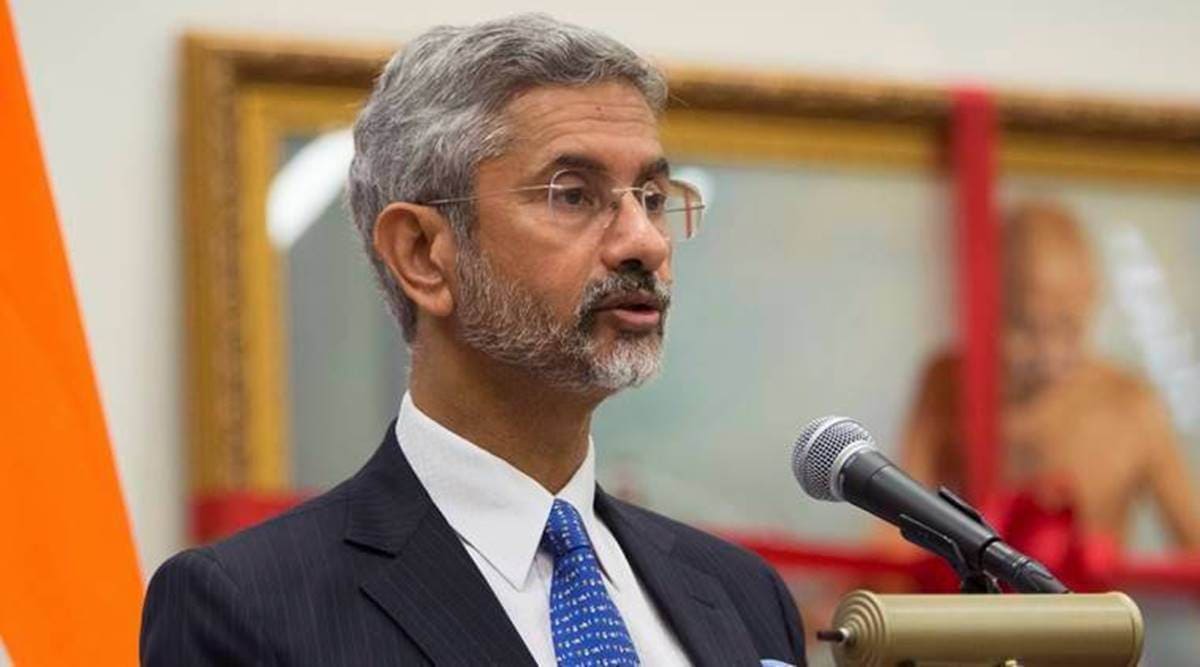
REITERATING THAT the relationship between India and China is at a crossroads, External Affairs Minister S Jaishankar said Thursday that the direction of bilateral ties depends on whether Beijing adheres to various agreements on maintaining peace along the border.
The remarks come a day after Army Chief General M M Naravane said that de-escalation along the border in eastern Ladakh is yet to take place, after the first step at Pangong Tso in February, and till that happens the entire border with China across all sectors will see enhanced troop presence.
Speaking at an Indian Express-Financial Times event, Jaishankar said: “I think the relationship is at a crossroads. And which direction we go, depends on whether the Chinese side would adhere to the consensus, whether it would follow through on the agreements, which we both have done for so many decades. Because what is very clear in the last year is that border tensions cannot continue with, you know, cooperation in other areas.”
In January, Jaishankar had said that the two countries were “truly at crossroads” and had spelt out eight broad principles and three “mutuals” to mend strained ties.
According to the Union Minister, China departed from the “1988 consensus” when the then Prime Minister Rajiv Gandhi went to Beijing, 26 years after the 1962 war, and established an understanding to maintain peace at the border. “Now, if you disturb the peace and tranquility, if you have bloodshed, if there is intimidation, if there is continuing friction in the border”, it would obviously impact the relationship, he said.
Jaishankar pointed to the signing of two important agreements in 1993 and 1996 on maintaining peace at the border. The stability at the border led to the expansion of relations in several sectors, but it was adversely impacted following what happened in eastern Ladakh, he said.
On China’s growing footprint, he said: “…you know it’s one thing to compete, it’s another thing to have violence on the border. So, I would make a differentiation here. Look, I am fairly confident, I’m not a small country, I have my capabilities, I have a high degree of cultural comfort and natural connectivity and societal contacts in my neighbourhood. And not just in my neighbourhood. I will go beyond. I mean, today my interest extends all the way deep into the Indo-Pacific on one side and then on to Africa and Europe on the other. So, I’m ready to compete. That’s not the issue. The issue for me is — how do I manage a relationship, if the basis of the relationship has been violated by one side.”
The External Affairs Minister said the economic relationship and ties in other sectors between the two countries were driven by the stabilisation of the border through the 1980s and 1990s.
Jaishankar refused to be drawn into criticism of China’s actions against the Uyghur in Xinjiang.
In a separate session, Lindsey W Ford, US Deputy Assistant Secretary of Defense for South and Southeast Asia, said: “What we have seen along the LAC to me is a concerning trend more broadly in terms of China’s behaviour towards its neighbours in recent years. So we obviously see similar kinds of things happening in the South China Sea where China appears to be just trying to change the facts on the ground, rather than trying to talk to its neighbours and peacefully resolve disputes according to the rule of law.”
On Indo-US ties, she said: “The US and India don’t have an alliance, what we do have is an incredibly close strategic partnership, and I think it stands on its own merits. The US-India relationship…is unique.”
“We don’t have a partnership with India because we are interested in containing China. We have a partnership with India because we have a lot of shared interests in things that we would like to work together on in the region,” she said.
On the Quad, Ford said: “What we hear from our partners across the Indo-Pacific region, is one, a NATO model doesn’t work for the Indo-Pacific, and the Biden administration is incredibly realistic about that. Certainly, we are focused on enhancing the Quad, but we are focused on enhancing the Quad as one of many mechanisms in a broader regional security network.”
Responding to a question on an alliance between India and the US, Jaishankar said: “Look, everybody is entitled to their dreams…our dreams have to have a basis in reality.”
He said: “We need to get over this Cold War precedent, which has conditioned our thinking…that’s not the world we live in anymore…And it’s not just the United States. I mean, we know from the Chinese as well you know this is the Cold War. Arguments of the Cold war cannot be used to deny other countries their right to maximize their options.”
On Quad’s agenda, Jaishankar said that with the passage of time, any initiative will mature. “Put aside this gamesmanship that this is directed against somebody, so we shouldn’t be doing it because it’s the return of the cold war — that’s gamesmanship, look at the reality. The reality is, you have today, multiple countries who have a proven degree of comfort with each other, find that they have a shared interest on key global and regional challenges, like connectivity, maritime sector, technology, vaccines, resilient supply chains, and even climate change,” he said.
The session was moderated by C Raja Mohan, Director, Institute of South Asian Studies, National University of Singapore, and Contributing Editor, The Indian Express, and FT’s Asia Editor Jamil Anderlini. The event is the second in the series organised by the Financial Times and The Indian Express about India’s place in the post-pandemic world.






















